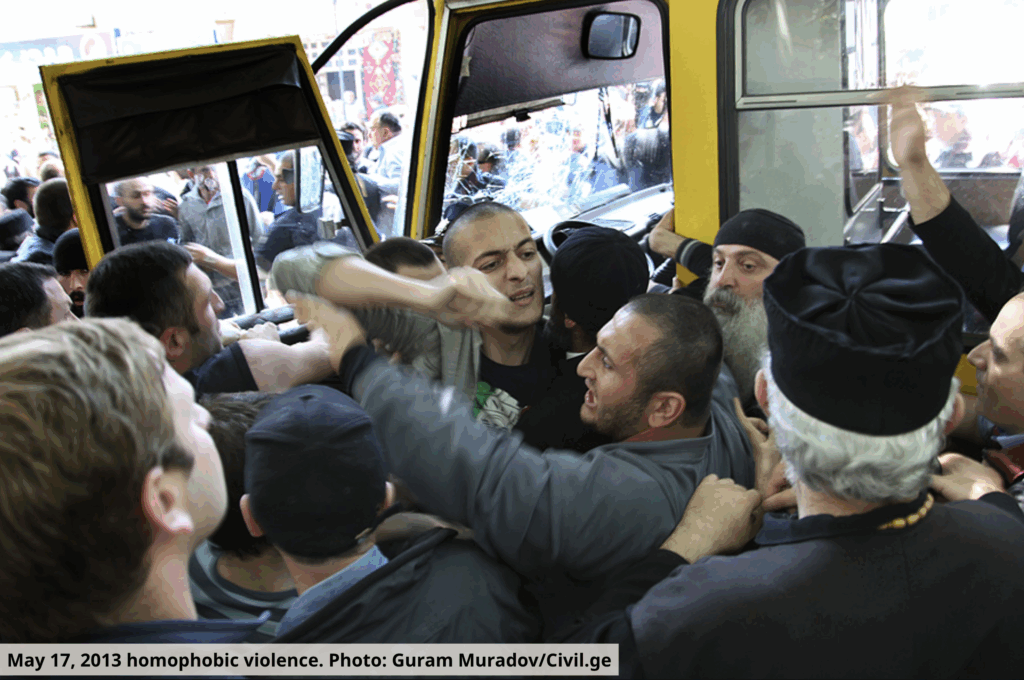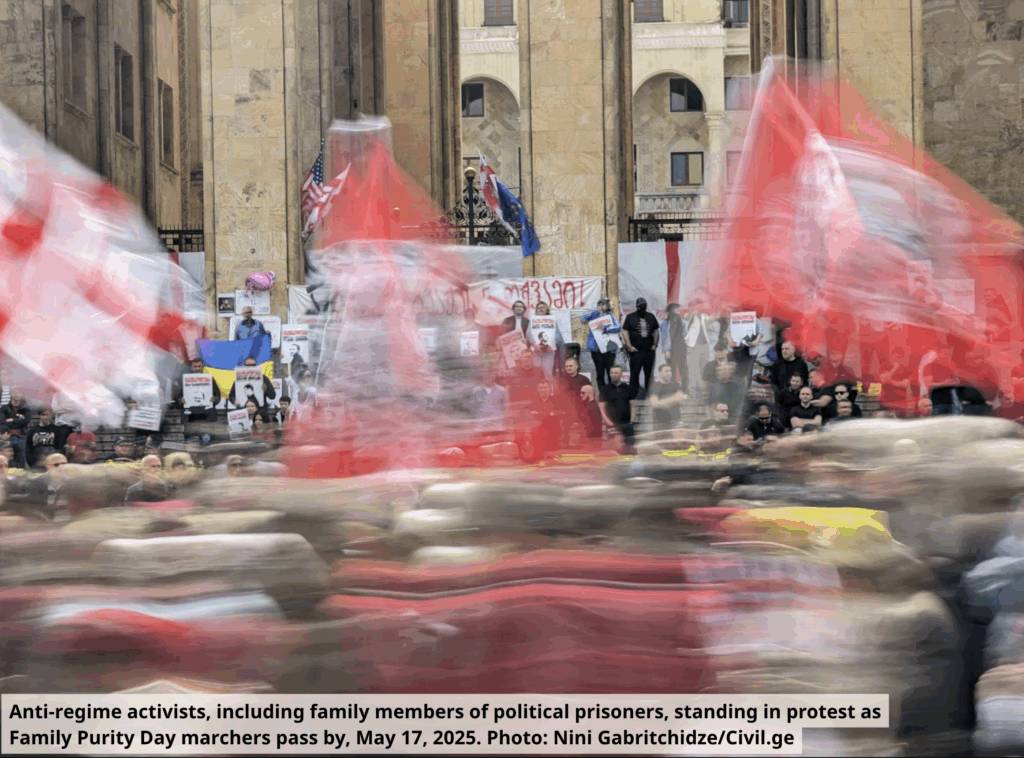Dispatch – May 20: May Saints
“May the Saints of this day be with you,” a middle-aged man said into his phone as he sent his best wishes on May 17. About fifty meters from him, large crowds were marching toward Tbilisi’s Holy Trinity Cathedral to celebrate the “Family Purity Day.” The phrase the man was using is a greeting that Georgian Orthodox Christians exchange on religious holidays, and religious holidays have their saints. But who are the saints of May 17? Are they those who were martyred on this day? Or are they the ones who are exclusively expected to act like saints on days like these? It probably doesn’t matter, because both happen to belong to the same group, the very group against whom this holiday was invented.
Here is Nini and the Dispatch newsletter to tell you how (not) to disappear completely.
“Everyone has marched but us,” a friend likes to complain, and he’s not wrong.
When, weeks into ongoing protests, the firework season gave way to the march season, Georgians got creative. Every possible group and community—whether professional, social, geographic, or cultural— organized their own march. They would arrive at Parliament one after another, sometimes over a dozen a day. Some groups marched multiple times, while at other times, it looked like people were rediscovering each other or inventing ad hoc communities to keep the spirit alive. It was new, inspiring, fun, and vibrant. But missing from this fun was the one group to which, for years, building a strong community culture meant survival.
Queers did march, but not as a separate group. Members of the LGBTQIA+ community have played an active role in the ongoing resistance, either as leading activists or as simple participants. However, openly embracing their identity and making their fight part of the general struggle for rights and freedoms has remained taboo. “There’s no time for that,” as the popular saying goes. The phrase is routinely used in Georgia to postpone crucial discussions as long as what is viewed as some “greater cause” is taking priority. That usually means indefinitely.
If someone shows up at a rally with a rainbow flag or a banner with the word “queer” on it, they shouldn’t expect universal love and understanding. Some will frown upon them for disregarding the common cause and allowing the Georgian Dream propaganda to smear the entire resistance as being run by gays. Others will inevitably spread conspiracies about them being planted by security services.
But it rarely gets that far these days. Queers “know their place”, and continue to lay low.
Which does not mean that they are left in peace. The ruling party and its mouthpieces continue to fight imaginary “LGBT propaganda”. Protesters, gay or not, have repeatedly reported experiencing homophobic slurs or harassment at the hands of the police. And even if queers don’t march, thousands still march against them: we now even have a public holiday for that very purpose.
Holy Pogroms
The designation of May 17 as the day of “Family Purity and Respect for Parents” has a well-known, sinister backstory. In 2013, an aggressive, homophobic crowd led by Orthodox clergy attacked a small rally marking International Day Against Homophobia, Transphobia, and Biphobia (IDAHOBIT) in downtown Tbilisi. People were injured, and the police evacuated the activists by bus. The next year, in an apparent attempt to hijack the date, the Orthodox Church proclaimed May 17 as Family Purity Day.
- Read our May 17, 2013 Reportage: Violence Against Anti-Homophobia Rally

Since then, clergy and parishioners have gathered annually to mark the day (and territory). All the while, LGBTQIA+ groups were slowly robbed of their few remaining spaces of assembly.
The gradual contraction of already limited public space began with violence and threats by far-right groups, which the police seemed unwilling to contain, and culminated in legislative bans in 2024. The anti-queer law took effect in December, restricting public gatherings for LGBTQIA+ people, banning gender recognition procedures, and imposing censorship in media and educational institutions. That law also made Family Purity Day an official holiday.
Georgian Dream’s desperation to secure a day off was unsurprising. In recent years, as the party faced massive public discontent, the Family Purity Day celebration has become increasingly associated with the demonstration of support for the ruling party. Some claim that the party ensures a high turnout, with rumors about people, including public employees, being bused in. The church-promoted, religiously tinted celebration may also provide more cautious, conflict-averse GD supporters with a “legitimate” reason to show their loyalty. And as one of the most influential institutions in the country, the church has no trouble attracting parishioners to the outdoor activity.
Party officials attend the gatherings en masse, and later bomb social media with pictures of the high public turnout. That’s how it was this year, too.
The day was festively marked in major Georgian cities. In Tbilisi, the gathering began at the Kashveti Church on Rustaveli Avenue, the epicenter of ongoing, nonstop anti-regime protests. The turnout was high, with a noticeable share of clergy, families with children, and teenagers in traditional Georgian attire. Georgian flags fluttered alongside white and blue May 17 flags. After a prayer, the crowd marched to Tbilisi’s Trinity Cathedral.
Mayday Paradox
And yet, something about this year’s gathering made it less intimidating. It seemed to lack the confidence, driving force, and, most importantly, faith necessary to rally for a big cause. All of that appeared to be better concentrated in a small group of protesters at a separate gathering in front of the parliament. As Family Purity Day celebrants marched by, the group, cordoned off by the police, firmly stood on the steps holding portraits of political prisoners arrested during ongoing protests. Family members of the jailed protesters were also there, staring down at the large gathering to amplify the contrast and irony of the day.
But where were the queers?
I remember May 17, 2013. Even after the queer rights activists had been evacuated, angry men in black — an international uniform for toxic masculinity these days — raged through Tbilisi’s central streets as if searching for prey. The sight was horrifying. Whatever side they were on was the wrong side, or so it seemed to me, then a still-ignorant student who happened to pass by. Sadly, it was on dark days like that the eyes of many Georgians have opened to see the degree of hostility and oppression the queer community endured in their country.

Twelve years passed, and LGBTQIA+ individuals find themselves in an even bigger paradox. They are the primary targets in the country’s rapid descent into illiberalism, yet often the ones most discouraged from openly fighting back as a community.
This year, the main line of opposition backlash against the ruling party and the church exploiting “family purity” has been to expose hypocrisy. Critics cite statistics about high numbers of women who have emigrated, families that have been split up, parents who have their children unjustly jailed, children who are growing up without their parents and in poverty, and women who are enduring domestic violence. The arguments seem on point. But are they enough?
How to (not) disappear completely
In the past years, arguments persisted that the queer community’s attempts at public self-expression has only worked against them. It only draws more conservative hate and aggression, many feared. But there might be a growing understanding that invisibility is not an option either. The strategy of “waiting for the right time” was tried when the parliament adopted the anti-LGBT law last year, but the next day, Kesaria Abramidze, Georgia’s most famous transgender woman, was brutally murdered. And not everyone can afford to protect themselves simply by hiding the rainbow flag and mixing with the crowd.
No public IDAHOBIT events were planned for May 17 this year. Older, larger political parties have also remained largely silent on the issue. However, newer, more progressive forces that have emerged in recent years have openly expressed their unconditional solidarity with LGBTQIA+ groups.
And later that day, the taboo was briefly broken at the traditional protest venue.
“They sow hate!” “Solidarity with queers!” – demonstrators chanted along the usual protest lines as daily loud Public Broadcaster march reached Rustaveli Avenue, the same place that hours earlier hosted Family Purity Day gathering. A group of protesters had again blocked the road as part of their daily routine and were greeting the marchers. Then there was a short speech that reiterated unconditional support for LGBTQIA+ groups.
It was in those brief moments, when they perhaps felt it was safe to do it, that a group of activists released smoke bombs in bright rainbow colors.
The smoke dissipated quickly. Nobody got hurt.
